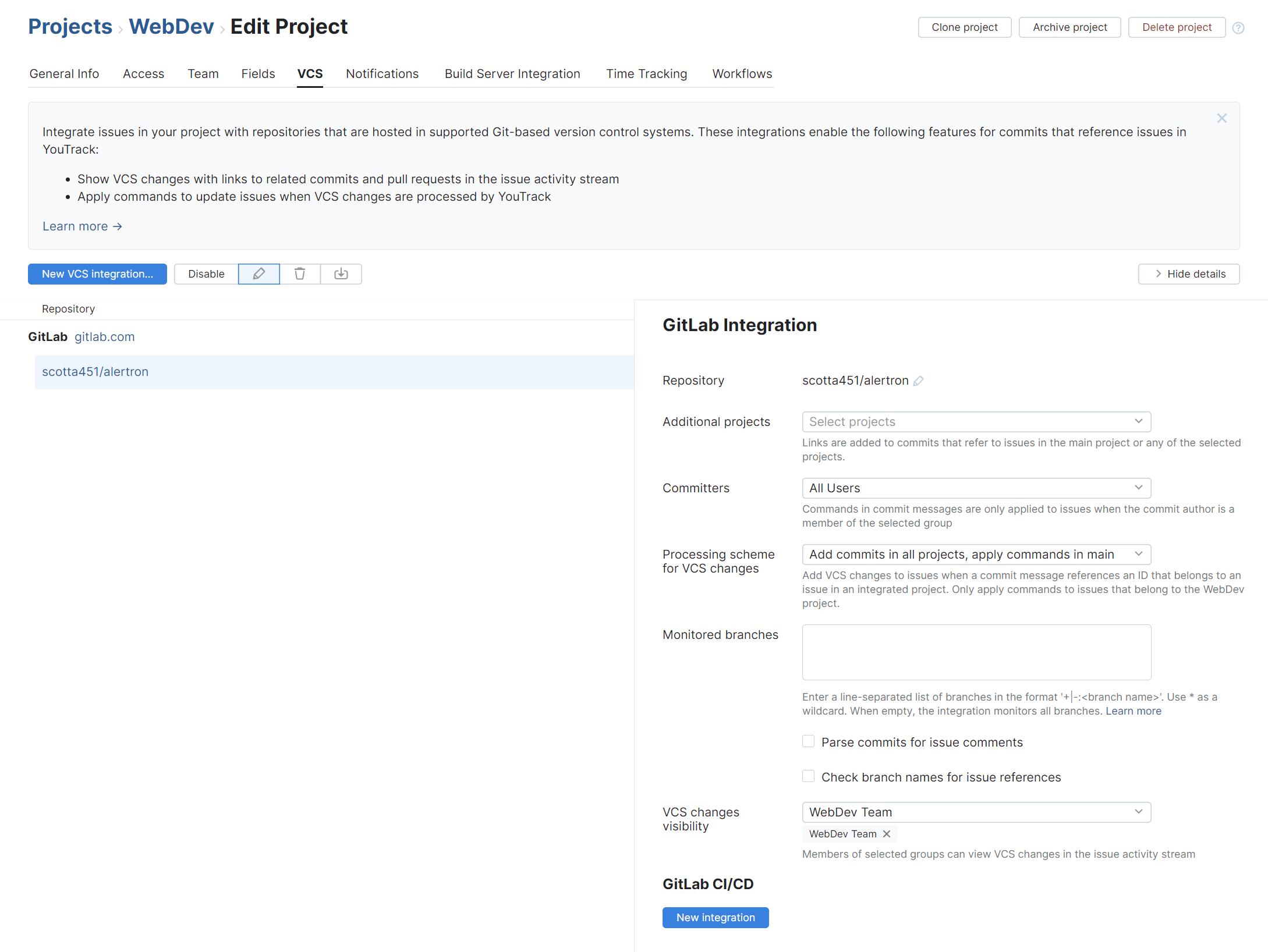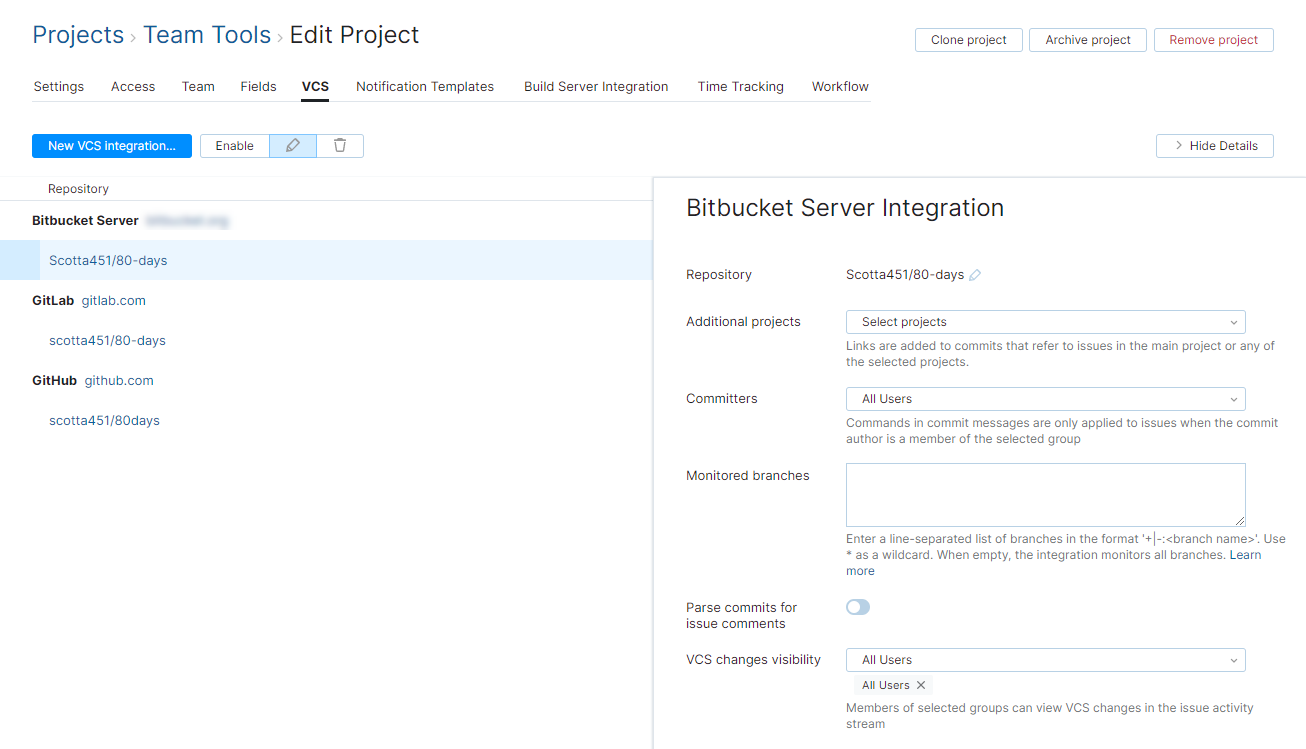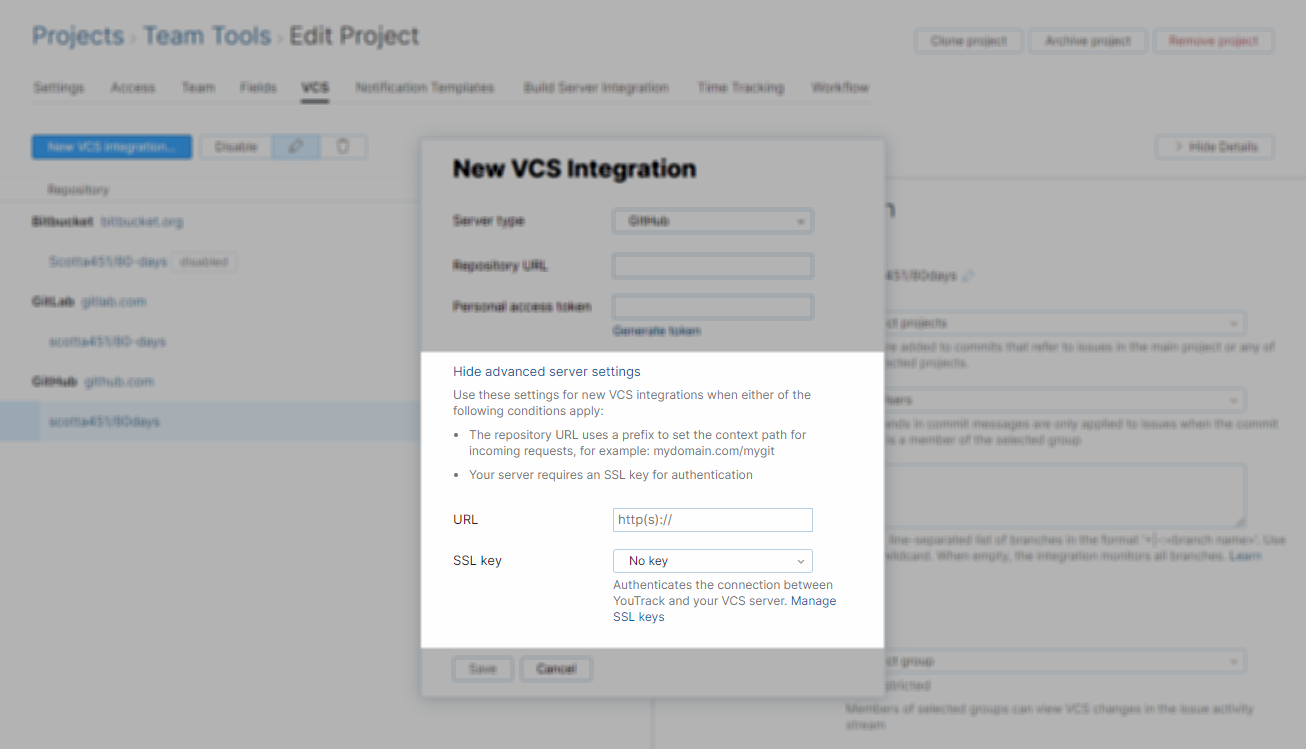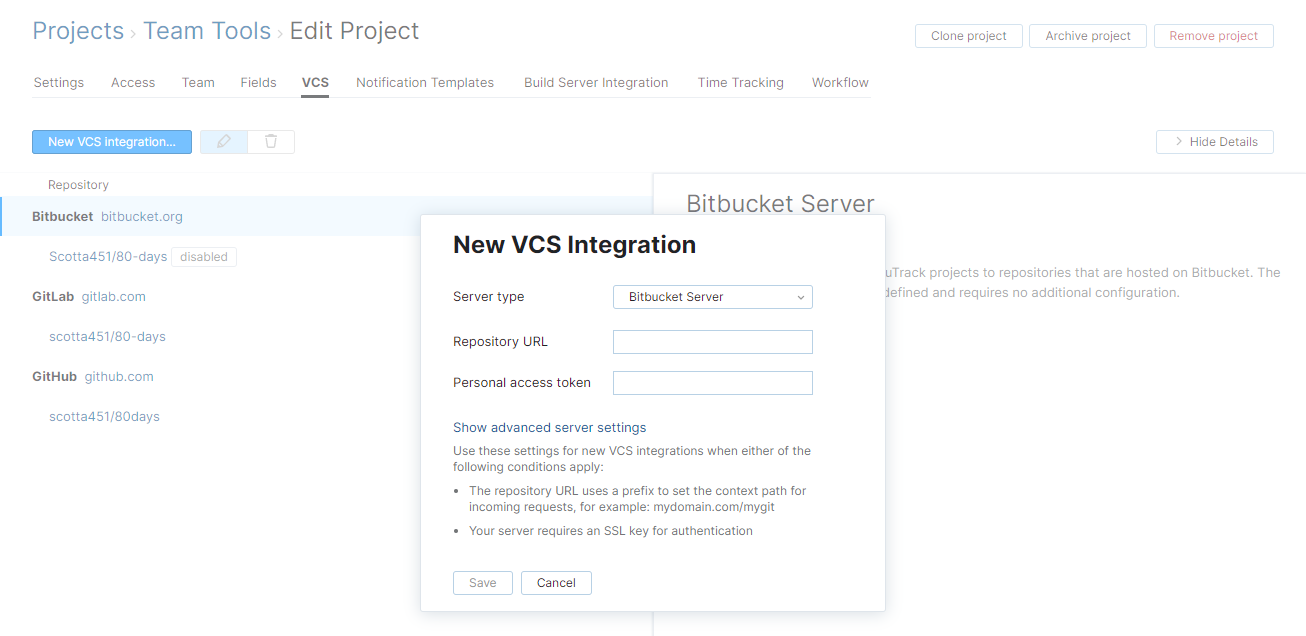Integrate with Bitbucket Server
You can integrate a project in YouTrack with VCS repositories on a self-hosted Bitbucket Server.
Integration with Bitbucket Server enables the following features in YouTrack:
Apply commands to YouTrack issues in commit messages. For more information, see Apply Commands in VCS Commits.
Track commits that are related to specific issues in the activity stream for each issue. For more information, see Commits.
Display the status of pull (merge) requests directly in the activity stream of any issue that is referenced in the title or description of the pull request. For details, see Pull Requests.
Add links to YouTrack issues in commit messages or branch names. For more information, see Link Issues in VCS Commits.
Prerequisites
YouTrack is accessible to inbound connections. Specifically, you need to make sure that your network doesn't block connections between your VCS server and YouTrack.
The account that you use to connect to Bitbucket Server has admin-level access to the repository. This is the user account whose personal access token is used for authentication. If you use an account that does not have admin-level access to the repository, you encounter a
You are not permitted to access this resourceerror.
Generate an Access Token in Bitbucket Server
The first thing you should do is generate an HTTP access token in Bitbucket Server. This token grants YouTrack access to the repository based on the access that is granted to your Bitbucket Server account. You can also create HTTP access tokens that grant permission to access at the project or repository level.
When you generate the token, you need to grant it the following permissions:
Setting | Value |
|---|---|
Project permissions | Project read |
Repository permissions | Repository admin |
If you generate the access token at the repository level, you don't have to specify permissions for the project.
To learn how to generate an HTTP access token in Bitbucket Server, please refer to the Bitbucket Support.
Configure the Bitbucket Server Integration
To connect with Bitbucket Server, you need to enter an HTTP access token that is associated with your Bitbucket Server user account, project, or repository. This authentication grants YouTrack access to the repository based on the permissions that are granted to the access token.
To connect to a Bitbucket Server repository:
Click the Projects link in the header to open the Projects list.
From the action menu for your project, select VCS.

Click the New VCS Integration button.
For the Server type, select Bitbucket Server.
Paste the URL that points to your Bitbucket Server repository into the Repository URL input field.
Enter the generated Personal access token.
Click the Save button.
Your YouTrack project is integrated with the selected repository in Bitbucket Server.
Commits from the Bitbucket Server repository that reference an issue in the project are displayed in the activity stream of the referenced issue.
The sidebar displays additional settings for configuring the VCS integration.

To learn more about these settings, see Integration Settings.
Advanced Server Settings
If you are unable to establish a connection to your repository using the basic settings on the New VCS Integration dialog, click the Show advanced server settings link.

You only need to enter values for these settings for new VCS integrations with the target server. If you already have a working integration with a single repository on the server, you can add integrations with other repositories without setting these parameters again.
Use the following guidelines to set the values for these settings:
Setting | Description |
|---|---|
URL | This setting helps to identify the path to the Bitbucket Server repository. If the repositories for your Bitbucket Server are available under To resolve this problem, enter the base URL for your Bitbucket Server. For example: |
SSL keys | If your server environment is set up to require client SSL authentication, select the keystore that contains the private key for your YouTrack server. This key identifies your YouTrack server when it tries to establish a connection with Bitbucket Server. This setting is only used to support HTTPS authentication as required by connections to your internal network. The list only displays SSL keys that are already imported into YouTrack. To learn how to generate keystore files and upload them to YouTrack, see SSL Keys. |
Integration Settings
By default, the VCS integration processes changes that are committed to the repository by any user in any branch. Any user who has access to the issue in YouTrack can view these changes in the issue activity stream.
If you only want to process changes by specific users in designated branches or restrict the visibility of VCS changes in YouTrack, you can customize the integration settings. Use the following settings to customize the integration:
Setting | Description |
|---|---|
Repository | Displays the path to the repository in the integrated version control system. If needed, you can edit the location of the repository after you have set up the integration. For instructions, see Edit Repository Settings. |
Additional projects | Integrates the linked repository with one or more additional projects. This setting is only available in projects that are set as the Main YouTrack project for the VCS integration. |
Committers | Restricts the ability to update issues with commands in commit messages to members of the specified group. VCS changes from users who are not members of the selected group are still attached to related issues, but any commands that are specified in their commits are ignored. |
Processing scheme for VCS changes | Choose how to process VCS changes when the commit message references an issue ID. The following options are supported:
|
Monitored branches | Stores the names of the branches that you want to monitor for changes.
If the address that you entered as the Repository URL when you connected to the repository points to a specific branch, this branch is automatically added to the list of monitored branches when you set up the connection. |
Parse commits for issue comments | When enabled, specific lines of text in commit messages are copied to issues as comments. When you copy parts of the commit message to the issue as comments, you can trigger @mention notifications and expose information to users who don't have access to VCS changes. This setting does not affect how commit messages are shown in VCS changes. The entire commit message, including commands and issue comments, is always shown as part of the VCS change record in the activity stream. You should only enable this option when:
To learn more about how YouTrack processes commit messages, see Apply Commands in VCS Commits. |
Check branch names for issue references | When enabled, the integration checks for references to issues in branch names for commits and pull requests. This option was added for teams that use a branch-per-ticket process, so their developers don't have to mention issue IDs in their commit messages explicitly. |
VCS changes visibility | Restricts the visibility of VCS changes to one or more groups of users in YouTrack. When unrestricted, the list of VCS changes is visible to any user who has permission to read the issue. |
Available Actions
When you select an integrated version control system in the list, the following actions are available in the toolbar:
Action | Description |
|---|---|
Disable | Shuts off the connection between the integrated project and the VCS repository. The configuration is not changed and can be enabled at any time. |
Edit | Opens the integration settings dialog in the sidebar for the selected project and repository. |
Delete | Removes the settings for the integrated project from YouTrack. This action also removes all VCS changes that were added to issues for commits in the linked repository. While the action itself cannot be undone, you can use the Import action to restore VCS changes that were removed accidentally. |
Troubleshooting
If you experience problems setting up an integration with Bitbucket Server, see if the following condition applies.
Condition — You're unable to establish a connection between YouTrack and Bitbucket.
Cause | Solution |
|---|---|
Your YouTrack server is secured with an unsigned TLS certificate. The unsecure connection is blocked by Bitbucket. | Enable the option to skip certificate verification in Bitbucket. This disables certificate verification when Bitbucket sends event payload requests to the webhook URL. To learn more about this option, please refer to the Bitbucket documentation. |
